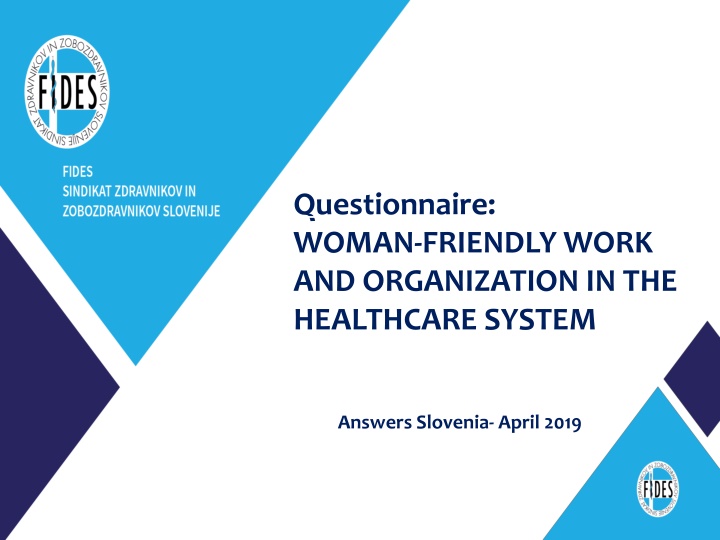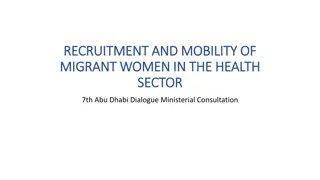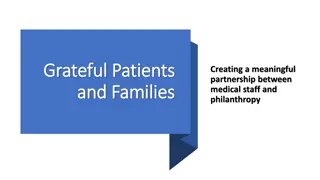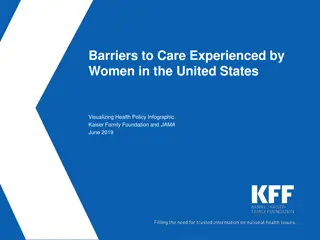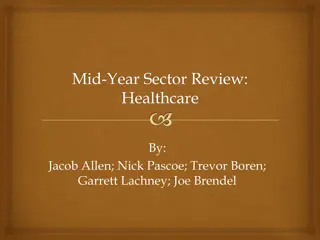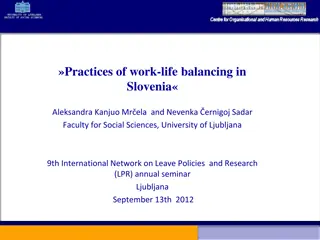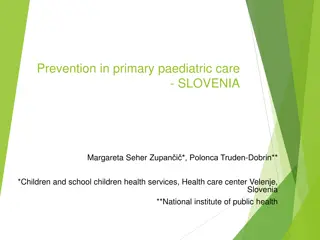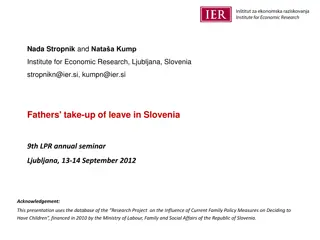Women in Healthcare: Insights from Slovenia's Medical Sector
The healthcare system in Slovenia reflects a growing trend of feminization, especially in the field of medical doctors. Despite favorable laws and agreements for women workers and equal salaries, leadership positions remain predominantly held by men. Data from 2018 shows a significant number of women doctors, with challenges such as discrimination reported from colleagues, supervisors, and patients. Working conditions are stressful, impacting women doctors' longevity in the profession. These insights highlight the need for better support and policies to address gender disparities in healthcare.
Download Presentation

Please find below an Image/Link to download the presentation.
The content on the website is provided AS IS for your information and personal use only. It may not be sold, licensed, or shared on other websites without obtaining consent from the author.If you encounter any issues during the download, it is possible that the publisher has removed the file from their server.
You are allowed to download the files provided on this website for personal or commercial use, subject to the condition that they are used lawfully. All files are the property of their respective owners.
The content on the website is provided AS IS for your information and personal use only. It may not be sold, licensed, or shared on other websites without obtaining consent from the author.
E N D
Presentation Transcript
Questionnaire: WOMAN-FRIENDLY WORK AND ORGANIZATION IN THE HEALTHCARE SYSTEM Answers Slovenia- April 2019
National Institute of Public Health (NIJZ) Slovenia, 2016 data % of women students enrolled to Medical Universities : Medicine: 1218; 68,5%, Dental medicine: 232; 69,9% Number and % of women doctors ( grouped by age): 4935; 63,35% Medicine: 6346/3984; 62,77% 25 - 29: 451; 66,42% 30 - 34: 690; 68,04% 35 - 39: 546; 65,86% 40 - 44: 477; 66,25% 45 - 49: 444; 66,56% 50 - 54: 453; 61,80% 55 - 59: 479; 61,96% 60 - 64: 337; 54,26% 65 - 69: 90; 37,19% 70 - 74: 16; 28,07% 75 - 79: 1; 9,09% Dental medicine: 1444/951; 65,85% 25 - 29: 69; 84,14% 30 - 34: 143; 70,44% 35 - 39: 125; 67,56% 40 - 44: 118; 58,70% 45 - 49: 149; 70,28% 50 - 54: 121; 70,76% 55 - 59: 84; 63.63% 60 - 64: 81; 64,28% 65 - 69: 39; 45,34% 70 - 74: 15; 44,11% 75 - 79: 7; 58,33%
According to official data from last year (2018) in Slovenia we have: 1.041.629 (50,2) women 1.034.966 (49,8) men Number and % of women doctors head of departments and in a leadership position: Graduates: 39% men, 61% women, Executive managers: 80% men, 20% women, Chairman of the board: 95% men, 5% women. Number and % of women doctors in your trade union and in the board of your trade union : 10 women and 16 men in the Main Board (38,46%) These numbers clearly show us the trend of feminisation in the field of medical doctors in our country. The feminisation is present in most of the fields looking the number of graduates in the past year. On the other hand the leadership in companies is still mostly represented by men. Laws and collective agreements are very favorable to women workers in our country. Also the salaries are on the same level for the same work or profession. On the OECD database Slovenia has only 2,6 doctors per 1000 inhabitants. This means that we are just ahead of Poland, Albania, Montenegro and Romania. The working conditions are bad and stressful. The problem is the work organisation. A recent study showed that the women general practitioners dye 10 years before the others slovenian women and this data should be a great red alert for our politicians!!!
1. How old are you? RESPONSES (Answered: 657) - 25-35 years old: 32,57% - 36- 49 years old: 35,46% - 50-60 years old: 24,20% - older than 60 years: 7,76 %
2. In your work, have you or did you ever feel being discriminated, as a woman doctor? RESPONSES (Answered: 655, Skipped: 2) - no, never: 38,78% - yes, from my colleagues: 19,24% - yes, from my supervisors: 17,10% - yes, from my patients: 24,89%
What is your opinion about work-life balance in your work organization? RESPONSES (Answered: 652, Skipped: 5) -I m fully satisfied with the organization in my workplace, both from a family friendly and career point of view: 4,29% -I m quite satisfied with the organization in my workplace, both from a family friendly and career point of view: 30,67% -I m not satisfied at all, neither from a family friendly nor from a career point of view: 16,26% -I m satisfied from a family friendly point of view but my career is deeply affected: 20,55% -I m satisfied from a carrer point of view but my family life is deeply affected: 28,22% 3.
4. work, for a more satisfying work-life balance? RESPONSES (Answered: 656, Skipped: 1) -Nothing: 1,07% -Remuneration: 39,18% -Access to career opportunities: 18,29% -Working time (part time, length of shifts, etc): 77,44% -Holidays and days off management: 30,03% -Professional recognition: 34,91% -More leadership: 22,10% -Other ( please, specify): 10,98% What would you improve in your
5. Are you satisfied of your professional carreer? RESPONSES (Answered: 652, Skipped: 5) -Yes, at all: 20,40% -Not at all: 13,19% -Yes, but I neglected my family life: 26,69% -No, but I preferred to dedicate more time to my family: 34,82% -No, I didn t have fair opportunities since I am a woman: 4,91%
6. Do you think, in your workplace, there is a fair involvement of women doctors for management roles? RESPONSES (Answered: 654, Skipped: 3) - Yes: 33,94% - Not at all: 23,39% - No, at the moment but there is a growing attention on this topic: 24,77% - Yes, and there is awareness regarding women authority: 17,89%
7. agreement that is, in your opinion, women or family oriented? In your Country, is there any law or collective RESPONSES (Answered: 648, Skipped: 9) - No: 71,45% - Yes: 28,55%
